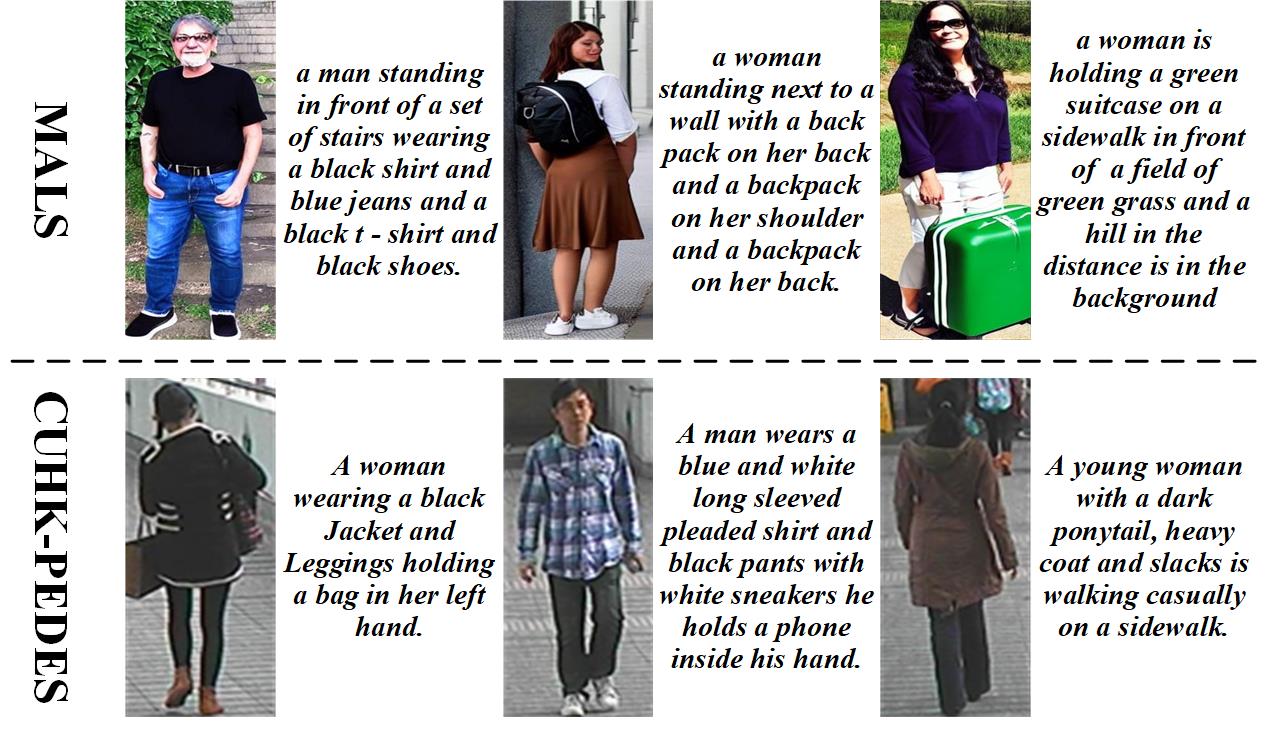APTM is a new joint Attribute Prompt Learning and Text Matching Learning framework, considering the shared knowledge between attribute and text. As the name implies, APTM contains an attribute prompt learning stream and a text matching learning stream.
We also present a large Multi-Attribute and Language Search dataset for text-based person retrieval, called MALS, and explore the feasibility of performing pre-training on both attribute recognition and image-text matching tasks in one stone. In particular, MALS contains 1, 510, 330 image-text pairs, which is about 37.5× larger than prevailing CUHK-PEDES, and all images are annotated with 27 attributes.
Extensive experiments validate the effectiveness of the pre-training on MALS, achieving the state-of-the-art retrieval performance via APTM on three challenging real-world benchmarks. In particular, APTM achieves a consistent improvement of +6.60%, +7.39%, and +15.90% Recall@1 accuracy on CUHK-PEDES, ICFG-PEDES, and RSTPReid datasets by a clear margin, respectively.
- The APTM is released. Welcome to communicate!
MALS leverages generative models to generate a large-scale dataset including 1.5𝑀 image-text pairs. Each image-text pair in MALS is annotated with one corresponding description and several appropriate attribute labels, indicating that MALS is not only effective for text-image matching and attribute prompt learning, but also explores the feasibility of pre-training for both attribute recognition and image-text matching in one stone.The dataset is released at Baidu Yun [4kq0].
Note that MALS can only be used for research, any commercial usage is forbidden.
This is the comparison between MALS and other text based person retrieval datasets.
These are examples of our MALS dataset and CUHK-PEDES. Annotation format:[{"image": "gene_crop/c_g_a_0/0.jpg",
"caption": "a young boy wearing a black hoodie leaning against a wall with his hands on his hips and his hands on his hips wearing jeans and a baseball cap",
"image_id": "c_g_a_0_0",
"label": [1, 0, ..., 1, 1]},
...
{"image": "gene_crop/c_g_a_0/20217.jpg",
"caption": "a woman in a white top and black pants posing for a picture in front of a brick wall with a pink carpet in front of her",
"image_id": "c_g_a_0_20217",
"label": [0, 1, ..., -1, -1]}]
The checkpoints have been released at Baidu Yun [b2l8]
we use 4 A100 80G GPU for training and evaluation.
Create conda environment.
conda create -n aptm python=3.8
conda activate aptm
pip install torch==1.9.1+cu111 torchvision==0.10.1+cu111 torchaudio==0.9.1 -f https://download.pytorch.org/whl/torch_stable.html
pip3 install -r requirements.txt
Download the CUHK-PEDES dataset from here , the PA-100K dataset from here, the RSTPReid dataset from here, and ICFG-PEDES dataset from here. Download the processed json files of the aboves four datasets from here [b2l8]
Download pre-trained models for parameter initialization:
image encoder: swin-transformer-base
text encoder: bert-base
Organize data folder as follows:
|-- data/
| |-- bert-base-uncased/
| |-- finetune/
| |-- gene_attrs/
| |-- g_4x_attrs.json
| |-- g_c_g_a_0_attrs.json
| |-- ...
| |-- cuhk_train.json
| |-- ...
| |-- icfg_train.json
| |-- ...
| |-- rstp_train.json
| |-- ...
| |-- PA100K_train.json
| |-- ...
| |-- swin_base_patch4_window7_224_22k.pth
And organize those datasets in images folder as follows:
|-- images/
| |-- <CUHK-PEDES>/
| |-- imgs/
| |-- cam_a/
| |-- cam_b/
| |-- ...
| |-- train_query/
| |-- gene_crop/
| |-- 4x/
| |-- c_g_a/
| |-- ...
| |-- i_g_a_43/
|
| |-- <ICFG-PEDES>/
| |-- test/
| |-- train/
|
| |-- <pa100k>/
| |-- release_data/
|
| |-- <RSTPReid>/
We pretrain our APTM using MALS as follows:
python3 run.py --task "itr_gene" --dist "f4" --output_dir "output/pretrain"
We fine-tune our APTM using existing text-based Person Reid datasets. Performance can be improved by replacing the backbone with our pre-trained model. Taking CUHK-PEDES as example:
python3 run.py --task "itr_cuhk" --dist "f4" --output_dir "output/ft_cuhk" --checkpoint "output/pretrain/checkpoint_31.pth"
python3 run.py --task "itr_cuhk" --evaluate --dist "f4" --output_dir "output/ft_cuhk/test" --checkpoint "output/ft_cuhk/checkpoint_best.pth"


